The Monastery life of Tibetan Buddhist monks (1)
The monastery is the world of the monk. The temple life of Tibetan Buddhist monks is special and unique.
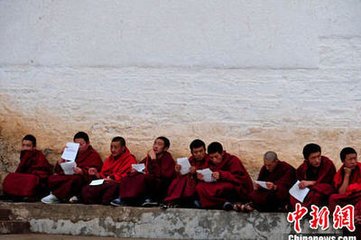
monks are learning Buddist sutras [Photo/ Chinanews.com]
According to rules and provisions, children that have reached an age in which they are able to drive away crows (between seven and eight years old), are only allowed to leave home. At the time that children leave their home their parents shave their head and just leave a skein at the top of their head, they must shaving this off with their own hands personally. All Tibetan Monks will be asked to give something up twice under the leadership of a senior monk and they will have to make the solemn oath to the classic scriptures and be asked to comply with monastic discipline, to have love for all living beings and practice what one preaches.
So after a child has entered the monastery and becomes a monk, what kind of lifestyle does he live there? After entering the monastery, firstly one should shave the head, then formally become an apprentice to a master and following, under the assistance of the teacher, they will clear their minds and mental capabilities, and in their
substitution will go forward in the name of religion, from this point forward they have become individuals that have totally left their homes. Young monks that have just entered the temple will be required to study basic knowledge about Tibetan writing, and at the same time they will be required to recite some simple odes and litanies to cultivate one's moral character and Buddhist etiquette, they will make prayers for all living things, for their happiness and also for their safety. After obtaining definite literary skills, then they will start to study Buddhist classics.
Every day just as the sun rises, life inside of the monastery begins. All of the monks awaken, and gather to the place of recitation in the “ Tsochen hall”, main scripture hall of the monastery where they conducted morning chants of sutras. Because many foods are normally rationed, tea is an indispensable component of the Tibetan diet and it is also such within the monasteries. Morning recitation of sutras is conducted for about two to three hours, during the time of which the young monks will line up three times to chant the sutras while entering the scripture house in succession to take butter tea and “Tuba” porridge. Every morning, the monks that participate in the morning chanting of scriptures ritual will take out one’s tsamba (Tibetan barley bread) which is rolled up and eaten along with the butter tea. At the same time that chanting of sutras has finished breakfast has also.
Following morning chants will be a.m. hours scripture recitation. From about nine a.m. until ten a.m.. The Tibetan Monks gather inside of various places of affiliation within the monastery’s scripture halls, on the one hand praying and reciting scriptures, and on the other hand drinking tea, the form is identical with that of the morning but the scale is comparatively small.
Once having reached the evening hours, that is in the afternoon around three to four o'clock, the monks will gather in their places of affiliation in the divided “ Khangtsen”(domitory in monastray), for reciting scriptures and drinking tea, for which the scale is even smaller.
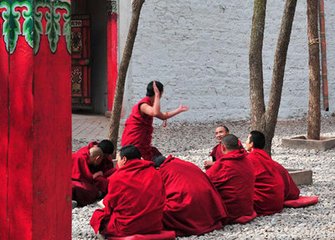
monks are debating Buddist sutras [Photo/agencies]
During the process of studying, repeated review and debate is conducted. The monks that read scriptures daily, other than praying three times will also conduct three debating meetings. They are called the morning debating meeting, the noon debating meeting and the evening debating meeting. Everyday the students either listen to the masters while they explain about text or conduct debates. The place for debate is in the monastery lawn and generally there are two people in a group one who asked and one who answers and at the same time as answering, support is drawn with the help of gestures, hand clapping, body movement as well as exclamations and shouts, all of which make the activity’s atmosphere more lively. Evening debates are generally voluntary and some students often conduct debates and research all the way up until the late hours of the night in order to fully grasp the true essence of the five Great Buddhist works. Some months leave the monastery during the winter and the spring and go to the Deep Mountain Temple to practice and temper one’s willpower.
Your Comment
Name E-mailRelated News
-
;
-
-
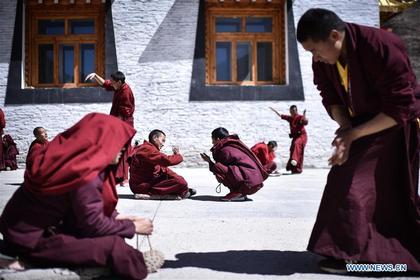
-
Monks debate on Tibetan Buddhism doctrines in NW China
Monks debate on Tibetan Buddhism doctrines at Labu Monastery in Yushu Tibetan Autonomous Prefecture, northwest China's Qinghai Province, April 18, 2016.
-
-
-
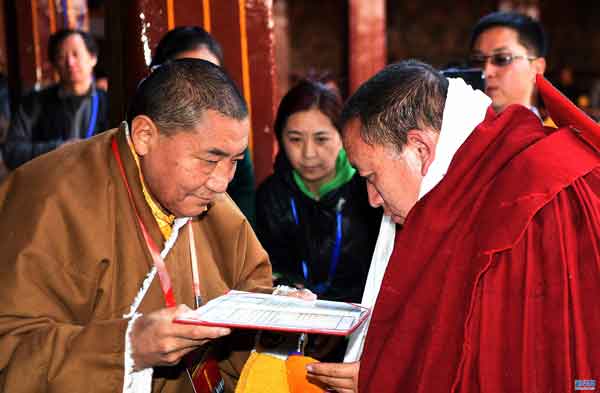
-
11 monks obtain highest academic degree of Tibetan Buddhism
Eleven monks received the certificates of Lharamspa degree at the Jokhang Temple in Lhasa on April 10.
-
-
-
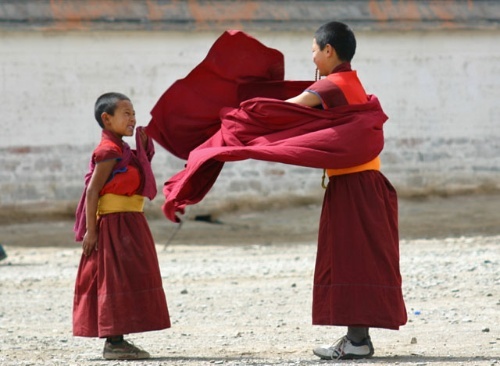
-
Tibetan monks benefit from fast development of temple facilities
Tibet has already realized full coverage with mobile phone signals reaching 5,261 administrate villages and completed the installation of phone lines connecting 1,770 temples.
-
-
-
Tibet Monks Hail Living Buddha Check System
AnewLivingBuddhaverificationsystemwaswelcomedbymonksandLivingBuddhasinsouthwestChina'sTibetAutonomousRegion,whosaiditwouldensuretheauthorityandrightsofverifiedlivingBuddhasandthenormalorderofTibetanBuddhism.
-
Based in Lhasa, Tibet Vista is a Tibet travel agency that specialized in Tibet permit, and Tibet tours for both private and group travelers at a local price!
•4 Days Lhasa City Group Tour from USD 460 •8 Days Everest Base Camp Group Tour from USD 850 •15 Days Mt.Kailash Group Tour from USD 1780 •2016 Tibet Train Tours from Beijing, Shanghai, Chengdu, Xining,etc










